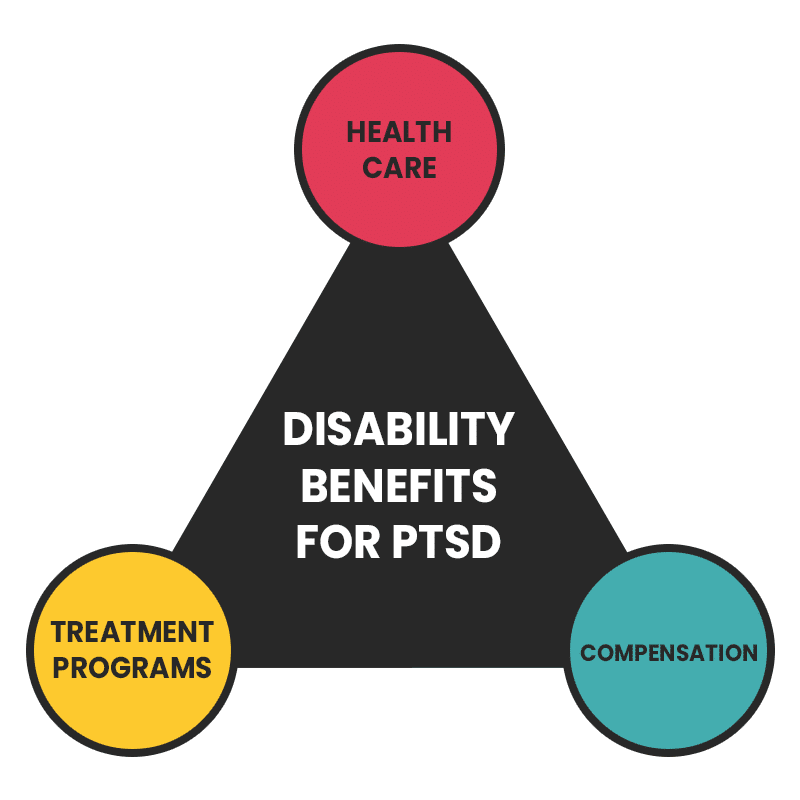If you are a veteran who suffers psychologically because of a traumatic event and meets certain criteria, you may qualify for post-traumatic stress disorder (PTSD) disability benefits. Knowing what qualifies a veteran for PTSD disability benefits can help you determine if applying for benefits is right for you.
Table of Contents
What Qualifies a Veteran for PTSD Disability Benefits from the VA?
You may be able to recover PTSD disability benefits if you meet certain requirements. The first is to have experienced a traumatic event, i.e., a stressor, that contributes to an experience that’s symptomatic of PTSD.
Additionally, the traumatic event must have taken place when you were serving. You’ll also need to prove that you are unable to function the way you could prior to the event, and you must receive a formal diagnosis of PTSD from a medical professional.
If you meet these criteria, you may have a better chance of successfully applying for PTSD benefits as a veteran.
What Qualifies as a Traumatic Event Under VA Guidelines?
According to Veterans Affairs (VA) guidelines, a traumatic event is one of two types of events. It could involve a threat of sexual assault, injury, or death. It may also be an event that actually leads to serious injury, sexual assault, or personal trauma.
If you experience these types of events, the VA may consider you a victim of a traumatic event. If a doctor diagnoses you with PTSD based on the trauma sustained after this event, and you meet the criteria mentioned above, you may apply for PTSD disability benefits.
What Are the Symptoms of PTSD?
If you’re not sure whether you actually have PTSD, you may look for symptoms of this condition. There are four main types of PTSD symptoms that people experience:
Reliving the Traumatic Event
In many cases, victims of PTSD relive the initial event that caused the PTSD when memories of the event return.
People may relive a traumatic event in a number of ways. For instance, they may experience terrifying and vivid nightmares that feel real. They may also see, smell, or hear something that they associate with the event. Some may experience a flashback that forces them to relive the event while conscious as if it were taking place again.
Avoidance
People with PTSD may also attempt to avoid anything that reminds them of the traumatic event and might function as a trigger.
For example, victims of PTSD may want to avoid driving due to a military accident involving vehicles. They may also want to avoid large crowds. In addition, they may attempt to keep busy to avoid any opportunities to discuss or think about the event.
Mounting Negative Thoughts and Feelings
Following a traumatic event and the onset of PTSD, you may experience more negative thoughts and feelings, often pertaining to yourself and others.
Some victims of PTSD may experience a degree of paranoia, for instance, as they lose trust in others. They may also repress memories of the event and refuse to talk about it. Victims could also wind up feeling numb and lose interest in activities they used to enjoy before the event. Meanwhile, others may feel shameful or guilty about the event, believing they could have done something to prevent it even if this wasn’t the case.
Hyperarousal
People with hyperarousal tend to be on alert and uneasy. As a result, they may be irritable and aggressive. If you have hyperarousal, you might experience difficulty concentrating or sleeping. You might also exhibit certain unhealthy behaviors, such as substance abuse or smoking. Additionally, sudden sounds or elements of surprise could startle you when on edge.
What Kind of Disability Benefits Can Veterans Get for PTSD?

In the event you qualify for PTSD disability, there are a few different types of benefits that you can recover. These include the following:
Health Care
A VA primary care provider can discuss your condition and determine if you have PTSD. From there, your provider can help determine what treatment you need along with support.
Compensation
You may also be able to recover compensation in the form of payments for your experience. This compensation would help cover medical expenses and the pain and suffering resulting from your condition.
Treatment for PTSD
The VA offers various resources for individuals that require treatment for PTSD. For example, the VA can connect you with over 200 treatment programs specifically covering PTSD. These programs will include one-on-one mental health assessments, medication that can help treat PTSD symptoms, family therapy, psychotherapy, and group therapy for veterans and special needs.
In addition, the VA can connect you with PTSD specialists at VA medical centers to provide outpatient care. Some programs also offer inpatient care programs that help individuals who are unable to function in their daily lives.
If you’re looking for a VA clinic or medical center, you can find one in your area through the VA facility locator. Even if you are unable to find a VA location in your area, the VA offers telehealth services that enable you to receive mental health care via phone.
How VA Rates PTSD and Other Mental Disorders
One way to determine whether you qualify for PTSD disability benefits is to calculate the rating of your disability. The VA rates mental disorders based on the level of debilitation they cause, with ratings going from zero to 100. The higher the rating, the more debilitating the mental disorder is for the patient.
For example, a patient with a VA rating of 0 may have a formal diagnosis for a mental health condition. However, this patient doesn’t exhibit any symptoms that lead to an inability to function daily or the need for medication.
On the other hand, a patient with a VA rating of 100 will experience 100% debilitation, meaning the person is unable to function and work on a daily basis due to serious symptoms. A person toward this end of the scale would experience symptoms such as grossly inappropriate behavior, gross impairment of communication or cognition, and hallucinations, among others.
Generally, if a person with PTSD or another mental disorder is unable to work because of his or her condition, this could lead to a 100 VA rating. This would result in unemployability (IU), which automatically counts as a 100% PTSD rating.
How to Get Veterans Disability Benefits for PTSD
To begin seeking PTSD disability benefits, you will need to complete the following steps:
Applying for PTSD Disability Benefits
If you meet the disability qualifying conditions, the first step to take toward recovering PTSD disability benefits is to apply for them.
Before applying, you’ll want to prepare plenty of evidence to support your claim. This could include written details about the traumatic event, a written PTSD diagnosis from a medical professional, and medical records disclosing PTSD treatment. You can also obtain supporting statements from close family and friends, individuals you served with, and other professionals who can detail your experience from their perspective.
Filing Additional Forms
When filing a claim for disability, you will need some forms to accompany your application.
These forms include:
- VA Form 21-0781 — A Statement in Support of Claim for Service Connection for Post-Traumatic Stress Disorder
- VA Form 21-0781a — A Statement in Support of Claim for Service Connection for Post-Traumatic Stress Disorder Secondary to Personal Assault
Working with a Veteran Disability Lawyer
If you need some help with filing for PTSD disability benefits, a veteran disability attorney may be able to help. You might ask, “Do I need a lawyer to file for disability?” While you may not necessarily require the help of an attorney, consulting with one can provide you with some additional guidance.
A veteran disability lawyer can help you gather and organize evidence supporting your claim when applying for benefits. As a result, you can increase your chances of succeeding.
Taking the Right Steps to Seek PTSD Disability Benefits
Following a traumatic event during service that results in PTSD, you may be able to recover disability benefits as a veteran. With the help of an attorney, you may increase your chances of successfully applying for these benefits and get the care you need from professionals in a VA facility or another setting.
If you have experienced a traumatic event and meet the requirements in place for PTSD disability, the VA may provide you with the benefits you need, from care and treatment to compensation.



